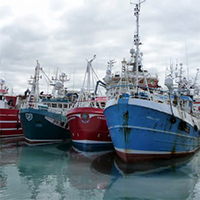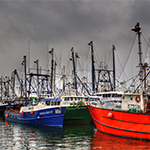Global seafood trade flows and developing economies
Seafood exceeds the trade value of sugar, maize, coffee, rice and cocoa combined. But where is this seafood going and who is most benefiting?
Rashid Sumaila receives Benchley Ocean Award for Science
He received the award at a gala ceremony at the Smithsonian’s National Museum of Natural History in Washington, D.C.
Rashid Sumaila wins UBC’s Killam Faculty Research Prize
This award recognizes faculty member’s “outstanding research and scholarly contributions”. Dr. Sumaila’s research on fisheries economics and the benefits of sustainable fisheries to society on a global scale is both important and timely in today’s political climate.
Better protection needed for Scott Islands marine National Wildlife Area, scientists urge
Signatories to the letter, sent to Hon. Catherine McKenna, Minister of Environment and Climate Change Canada, include IOF’s Amanda Vincent, Daniel Pauly, Kai Chan, and Rashid Sumaila.
Rashid Sumaila wins Benchley Ocean Award for Excellence in Science
Referred to as the “Academy Awards for the ocean,” the Benchley awards are the world’s preeminent ocean awards.
Rashid Sumaila named a Hokkaido University Ambassador
Dr. Sumaila has an international reputation as a scholar specializing in bioeconomics, marine ecosystem valuation and the analysis of global issues such as fisheries subsidies, IUU (illegal, unreported and unregulated) fishing, and the economics of high and deep seas fisheries.
Future fisheries can expect $10-billion revenue loss due to climate change
Global fisheries stand to lose approximately $10 billion of their annual revenue by 2050 if climate change continues unchecked
High seas fisheries management could recoup losses due to climate change
Strengthening governance and closing the high seas to fishing increased the resilience of coastal countries to climate change, especially in tropical countries where there is a high dependence on fisheries for food and livelihood.
West Africa fisheries experts welcomed
Fisheries scientists and experts from Mauritania, Senegal, Gambia, Cape-Verde, Guinea Bissau, Guinea, and Sierra Leone will attend a capacity-building workshop at UBC. Updates added.
Bright spots shine light on the future of coral reefs
In one of the largest global studies of its kind, researchers conducted over 6,000 reef surveys in 46 countries across the globe, and discovered 15 locations where there were a lot more fish on coral reefs than expected.








